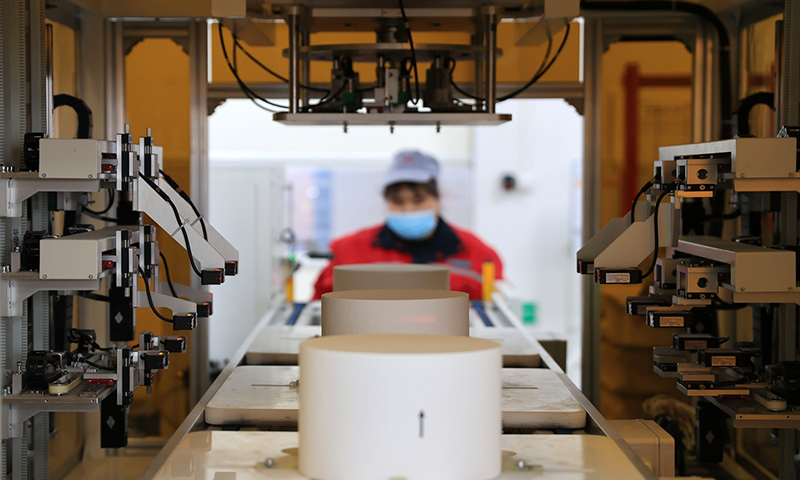China is moving swiftly to further accelerate what officials call the “new industrialization” process, aiming to upgrade traditional industries, cultivate new strategic industries, and promote advanced manufacturing and digitalization, a broad campaign to ensure the country’s industrial security and competitive edge amid rapidly rising global competition and risks.
Advancing new industrialization has become a buzzword in top policy documents and meetings since 2022, and in recent days Chinese officials have called for greater efforts to accelerate the process. The renewed emphasis on the subject indicates more policy measures are forthcoming, as part of China’s broad efforts for high-quality development amid downward pressure and a complex external environment marked by fierce competition, protectionism and decoupling efforts, analysts said.
On Wednesday, Premier Li Qiang chaired a State Council (China’s cabinet) executive meeting, which highlighted efforts to boost industrial development quality, efficiency, and international competitiveness and stressed that China was mulling more efforts to advance new industrialization at a faster pace.
The meeting also emphasized the need to push the transformation and upgrading of traditional industries while cultivating strategic emerging industries, accelerating the development of advanced manufacturing industries, and promoting digital industrialization and industrial digitalization in a coordinated way.
Advancing new industrialization was included in the report to the 20th National Congress of the Communist Party of China in October 2022, and it has been stressed in top meetings such as the annual Central Economic Work Conference (CEWC) in December 2022. The CEWC stressed that industrial policies should be optimized to facilitate the transformation and upgrading of traditional industries and the cultivation and growing of strategic emerging industries, and also to shore up the weak links in industrial chains. It also placed emphasis on making breakthroughs in key and core technologies.
On Thursday, during an inspection tour in Beijing, Li also underscored the importance of self-reliance in crucial technologies and links and grasping the initiative of development. “As China is at a crucial juncture of high-quality development, we should further boost confidence in development and maintain resolve in promoting industrial transformation and upgrading,” Li said.
The increasing emphasis on advancing new industrialization comes as China firmly pursues high-quality development amid lingering downward pressure and intensifying global competition, protectionism as well as the US’ campaign to contain China’s development.
“As the world is undergoing major changes, especially with the US-led West trying to build a ‘small-yard, high-fence’ technological blockade against China to cut off China’s development path, we need to make breakthroughs. New industrialization is a crucial pathway for us to ensure independent and controllable industrial chains,” said Cong Yi, a professor at the Tianjin University of Finance and Economics.
Cong told the Global Times on Friday that new industrialization mainly focuses on strategic emerging industries, such as artificial intelligence, big data, biomedicine, aerospace, new materials and new energy. “In other words, it should be driven by strategic new industries, focus on high-quality development of traditional industries, and carry out structural upgrading of industries,” he said.
China’s industrial sector has seen steady expansion in recent months as the industrial upgrading continues to pick up pace. In August, China’s value-added industrial output increased by 4.5 percent year-on-year, higher than a reading of 3.7 percent in July and beating foreign media predictions of a 3.9-percent growth.
Meanwhile, investment, including foreign investment, in advanced manufacturing and other emerging industries has continued to surge. In the first half of 2023, foreign investment in China’s high-tech sector saw a 7.9-percent growth year-on-year, and that in high-tech manufacturing saw a 28.8-percent growth, according to official data.
Wang Peng, an associate research fellow at the Beijing Academy of Social Sciences, said that amid intensifying international competition, China’s new industrialization push is not only a crucial part of high-quality development but also a crucial move to bolster China’s supply chain and reduce reliance on external supplies.
“At the same time, it also concentrates our advantages to overcome difficulties and firmly grasp the core of our own development,” Wang told the Global Times on Friday, noting that the focus of new industrialization is on frontier sectors.
Many provincial level governments have also taken swift measures to boost development of high-tech industries. On Friday, the Beijing municipal government announced an eight-point action plan to create an ecosystem for frontier industries. Also on Friday, Central China’s Hubei also announced 10 measures to make breakthroughs in core technologies.
(Global Times)




